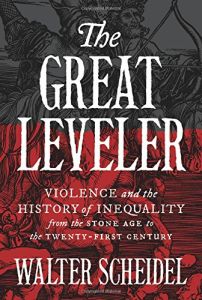Join getAbstract to access the summary!

Join getAbstract to access the summary!
Walter Scheidel
The Great Leveler
Violence and the History of Inequality from the Stone Age to the Twenty-First Century
Princeton UP, 2017
What's inside?
Want income equality? History says to start a revolution – a bloody, devastating one.
Recommendation
Stanford professor Walter Scheidel argues that more-equal distributions of wealth correlate with calamitous events – world wars, communist revolutions and devastating pandemics. His fascinating analysis covers historic lost empires, the Black Plague, World Wars I and II, the Russian and Chinese Revolutions, and the collapse of Somalia, among many other historical eras and trends, including early agricultural societies and present-day economic circumstances. He believes that the era of widespread warfare, bloody revolution and deadly plague has now faded. Scheidel proves knowledgeable, perceptive and erudite, but at 500-plus pages, this could be tighter. Even so, getAbstract recommends his enlightening, singular study to international investors, global managers, policy makers, NGO activists and academics seeking a fresh analysis of a contentious topic.
Summary
About the Author
Walter Scheidel is a historian and professor of humanities and classics at Stanford University, where he is also a fellow in human biology. He has written several other books.



















Comment on this summary